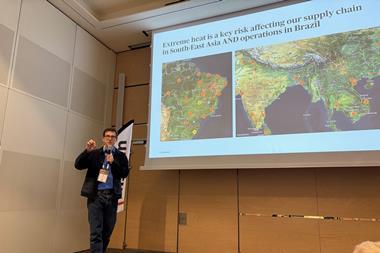The directors and officers liability insurance (D&O) market is in a state of turmoil. Vastly higher premiums coupled with restricted cover have come at a time when directors are under closer scrutiny than ever before. Charles Boorman gives the UK view
The current difficulties being experienced in the UK D&O market have been heavily influenced by the size and frequency of claims in the US. Various corporate calamities and resultant shareholder lawsuits have decimated the estimated $3bn US D&O premium pool. While September 11 has had little direct effect on D&O claims, it has acted as a catalyst in pushing the D&O market ever higher.
Investors have seen the value of their stocks fall through the floor amidst allegations of wrongful accounting practices. Incredibly, seven out of the largest 10 bankruptcies in history have occurred in the last 18 months. Directors are now very much in the firing line.
As one US Senator recently said, "We all know, based upon our legal system, that this is going to be abused". It has been known for law firms specialising in securities cases to instigate class actions against major US and foreign firms when bad news hits, in the hope that something will stick. It is big business: 12 claims have been settled for over $100m in the past 24 months and five for over $200m. Most are likely to have been paid out by insurers. The average securities class action settlement weighs in at a hefty $38m.
The situation in Europe is not as dire, because of the difficulty and cost involved in bringing shareholder actions. However, international companies with US shareholders are by no means exempt from the US legal system. Of the 488 securities class actions last year, 44 were against foreign companies, compared with just 12 in 2000.
Risk managers of companies without a US listing may be wondering what this has got to do with them. Unfortunately, their D&O premiums are on the increase for two main reasons.
What can you expect?
A risk manager of a US-listed international telecommunications company should not be surprised to be on the receiving end of 500% plus premium increases. A small, successful UK manufacturer with no US exposure could expect a 25% - 35% increase.
On top of premium increases, there are likely to be a number of coverage restrictions.
Allocation of defence costs restricted Some insurers give 100% allocation (essentially entity defence costs where it is named as a co-defendant). Most D&O policies, however, allocate defence costs on a 'best efforts' basis, which means that insurers will not pay the company's defence costs where it is named in an action with a covered individual. While one or two insurers still offer 100% allocation, it is likely that this coverage extension will be phased out.
Higher company reimbursement deductibles For companies with a US exposure, deductibles have been increasing for claims where the company is agreeing to reimburse. While deductibles are still rare for UK risks, we may soon see them creeping in.
War and terrorism exclusion This is not a market-wide phenomenon, although some insurers have introduced it as a direct result of September 11.
Outside directorship liability restricted Insurers are increasingly reluctant to automatically cover directors when serving on outside boards. If any outside directorships are held with US registered companies it is likely insurers will want details before agreeing to include them in coverage.
Failure to insure exclusion This would exclude claims aimed at any directors responsible for failing to maintain adequate insurance. In the past, there have been a number of such claims in Europe. Historically they have been covered, but are being excluded in some instances nowadays.
Official investigations The cost of legal representation at official investigations are usually covered in full. Insurers are beginning to sub-limit this cover and exclude US investigations entirely.
Retention waiver deleted For claims where the insured person successfully defended a case, the deductible has historically been waived. The clause that allowed this is now sometimes being deleted.
Insolvency exclusion These are rare but are applied as a last resort for risks that are in severe financial crisis, where remarketing is not an option. Insurers may offer this cover on a 'buy back' basis, but will require positive feedback on how the company is going to improve its financial position.
Extended reporting period (ERP) restricted Historically ERPs have been on a favourable basis, allowing the insured to invoke the clause if renewal is refused and alternative insurance is not placed elsewhere. Nowadays the additional premiums required are increasing dramatically, with concurrent reductions in the period of cover. In some cases, the ERP can only be invoked if the insurer refuses to renew the policy.
No automatic acquisition cover Due to the number of claims relating to acquisitions, insurers are requesting information as and when acquisition activity occurs instead of providing cover on a blanket basis.
Entity extensions withdrawn An entity extension undermines the intent of the policy to exist for the exclusive benefit of individual directors and officers, as the limits are shared with the corporation. In bankruptcy cases a court may rule that the entire policy limits go to the creditors as an asset of the company, leaving the directors and officers completely exposed. This extension is therefore being severely restricted.
What can you do?
Your recourse is determined by such factors as the size of your company, the industry, US exposure and financial results, but some tips apply to all.
CONSIDERATIONS IN EUROPE
Associated Business Lawyers in Europe (ABLE) have produced a helpful guide, Accepting a Directorship in Europe. This says that directors' liability has become a hot topic in most European countries. In France for instance, there is extensive litigation. The law there is changing so that, in addition to directors' criminal liability, the company can itself be criminally liable and may face penalties five times the amount faced by individuals.
ABLE also warns that jurisdictions vary in their treatment of D&O liability insurance. Expatriate directors should check where the company indemnification clause is valid; in France, there is no indemnification against third party claims for breach of directors' duties. www3.lawgram.com/Pub/Publications/DirectorshipABLE.pdf
RISK DIRECTIONS
The autumn issue of AIRMIC's overview of risk management issues, Risk Directions, includes an interview with Damien Coates, Vice President with responsibility for management with AIG in London, on keeping directors protected. He says that insurers will want to see:
You can download copies of Risk Directions at AIRMIC's website, www.airmic.com
Charles Boorman is business developer, Corporate Liability Unit, Aon Ltd, Tel: 020 7882 0417, E-mail: charles.boorman@ars.aon.co.uk




















